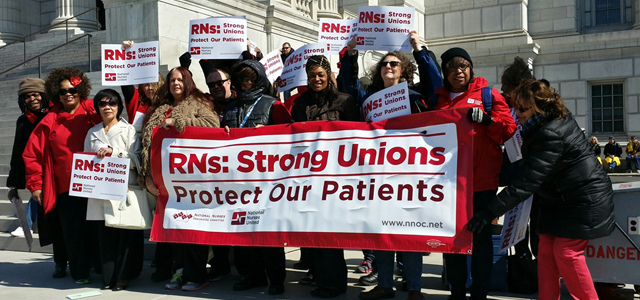Press Release
RNs at Capital to Protect Missouri Patients—Wednesday

SUPPORT—Safe Patient Handling bill as critical for hospital safety
OPPOSE—Alleged ‘Right to Work’ bill weakens RNs ability to advocate for patients
Support for Safe Patient Handling
As part of their annual lobbying day, registered nurses from hospitals in Kansas City and St. Louis, members of National Nurses Organizing Committee (NNOC)-Missouri, will be seeking support for the ‘Safe Patient Handling and Movement Act’ (HB 2162), sponsored by Representative Judy Morgan, which puts in place known solutions available to reduce an increasing number of patient and caregiver injuries, resulting from lifting patients.
HB 2162 provides uniform safety standards by replacing manual lifting and transferring of patients with powered patient transfer devices, lifting devices and designated lift teams available at all times.
“This is a win-win for all involved,” said Michelle Ziegler, RN, who works in an intensive care unit. “This law substantially minimizes the risk of unnecessary injuries. It protects nurses and others carrying out manual lifts that should be done by modern lift equipment. That, in turn, protects patients from falls. Hospitals in the end save money because injuries are reduced and Missouri pays nothing for the upgrade.”
Nurses and other healthcare workers top truck drivers as the profession with the highest rate of occupational injuries, and annual costs associated with these injuries in the U.S. approximately $7,400,000,000.
Opposition to ‘Right to Work’ and ‘Paycheck Protection’
The RNs will also be meeting with legislators over the course of the day and joining with unions from around the state at noon to send the message that so-called ‘Right to Work’ (RTW) and ‘Paycheck Protection’ laws pose a safety threat to Missouri patients and communities.
RTW states rank worse, on average, than union shop states on a wide range of social and public health outcomes including a higher prevalence of smoking, occupational fatalities, child poverty, infant mortality, preventable hospitalizations and cardiovascular deaths.” (US Bureau of Labor Statistics, US Department of Labor, Occupational Employment Statistics Survey 2008)
Additionally, strong unions provide RNs with a collective voice to advocate for the needs of patients at the bedside. Non-union nurses are often fearful that speaking up against unsafe patient care and conditions will result in retribution from their employers.
“My union allows me to be a better patient advocate, said Marchelle Bettis, an RN at Saint Louis University Hospital. “We negotiated patient care protections and a process to track unsafe practices and negotiate ongoing improvements. These laws will weaken our contract and impair our ability to be effective patient advocates.”